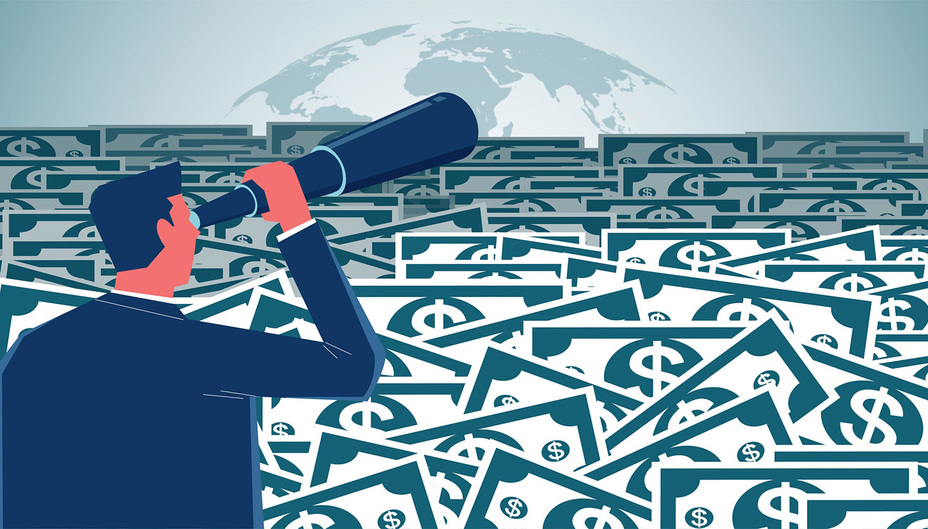How Travel Can Affect Your Investing Strategy
Written by The Inspired Investor team
Published on March 15, 2024
minute read
Share:
Some people plan holidays with palm-lined beaches, standout golf courses or world-renowned museums. When Dave Keil books a trip, he wants to see sights that could help him boost his investment portfolio.
On a 2005 trip to Las Vegas for a friend’s stag, for instance, the investor slipped into the Consumer Electronics Show to check out new tech trends. More recently, on a trip to California, he made a side trip from Los Angeles to San Diego with a dual purpose in mind: to take his young daughter to the San Diego Zoo, and, maybe more importantly, to check out a solar car maker he’d been eyeing as a possible investment.
Although he wasn’t won over by what he saw from the car maker, the lifelong investor saw value in carving out time on his trip to fit in the in-person visit. “I’m glad I went – sometimes you need to see things for yourself to be sure,” he says.
Keil, a Canadian who now calls Turks and Caicos home, is currently preparing for an upcoming trip to Italy, where he’ll stop by a motorcycle factory and may take a closer look at some Italian fashion brands. While some might view this as a chance to upgrade their ride or look, for Keil, the trip will help him decide if he should make space in his portfolio for these brands. “I’ve got to do some more homework,” he said a few weeks before leaving. “But I’ll probably check a few out.”
The risk of home bias
Travel can be a great way to gain global insights and expand your portfolio. Time spent abroad – or even in a different region of Canada or the U.S. – can open your eyes to emerging trends, industries and markets you wouldn’t have been exposed to otherwise. It can also help you overcome what’s known in the investing world as home country bias – the tendency to overload your portfolio with domestic assets.
In Canada, most investors have overallocated home-based assets; studies show that Canadian stocks represent more than half of the average portfolio. Domestic equities have advantages, there’s no withholding tax on dividends, for instance, and no foreign currency risks. But given that Canada’s publicly traded companies comprise only about 3 per cent of the world’s market capitalization, portfolios overweighted with Canadian companies don’t capture most strengths of the global economy. They also lack diversity, since more than two-thirds of Canadian equities are tied to the financial service and resource sectors.
Jim Rogers, a former Wall Street investor and co-founder of the Quantum Fund with George Soros, has made two round-the-world trips aimed at exploring global economic trends and investing opportunities. In the early 2000s, he visited Egypt and predicted turbulence that would lead to the downfall of President Hosni Mubarak, the prospect of which he wrote about in his subsequent book, Adventure Capitalist. On the same globe-spanning trip, he glimpsed signs of the rise of Asian economies, and became so convinced of the strength of the region he relocated his family to Singapore.
Inform your investment decisions
Travel can also help investors make informed decisions about assets to avoid. On a 2010 trip to England, Keil was so struck by the high exchange rate versus the U.S. dollar that he decided to stay away from U.K. investments. He was convinced the “economic headwinds were too strong.” That turned out to be true – Britain’s FTSE 100 index is up just 38 per cent since January 2010, while America’s S&P 500 has climbed by 347 per cent.
Seeing how companies operate – whether it’s an actual site visit or how consumers interact with a product in that country – can give you information you can’t glean from articles or quarterly statements. For instance, when Keil wanted to see how well a Canadian publicly traded construction company was run, he made a point to check in on one of their sites when he returned to visit family see how organized it was.
In many ways, travelling to explore the viability of a foreign economy or a new industry or asset is similar to the intelligence-gathering business analysts do before writing reports; a good retail analyst will conduct fieldwork in chain stores, for instance, to assess inventory, customer service and other factors that contribute to a company’s success.
Legendary investor Warren Buffett advises people to “invest in what you know.” In that respect, if you’re planning to invest in non-domestic assets, when possible, it makes sense to take a look at them firsthand. Once you’ve done your due diligence, you’ll be in a better position to make an informed decision.
RBC Direct Investing Inc. and Royal Bank of Canada are separate corporate entities which are affiliated. RBC Direct Investing Inc. is a wholly owned subsidiary of Royal Bank of Canada and is a Member of the Canadian Investment Regulatory Organization and the Canadian Investor Protection Fund. Royal Bank of Canada and certain of its issuers are related to RBC Direct Investing Inc. RBC Direct Investing Inc. does not provide investment advice or recommendations regarding the purchase or sale of any securities. Investors are responsible for their own investment decisions. RBC Direct Investing is a business name used by RBC Direct Investing Inc. ® / ™ Trademark(s) of Royal Bank of Canada. RBC and Royal Bank are registered trademarks of Royal Bank of Canada. Used under licence.
© Royal Bank of Canada 2025.
Any information, opinions or views provided in this document, including hyperlinks to the RBC Direct Investing Inc. website or the websites of its affiliates or third parties, are for your general information only, and are not intended to provide legal, investment, financial, accounting, tax or other professional advice. While information presented is believed to be factual and current, its accuracy is not guaranteed and it should not be regarded as a complete analysis of the subjects discussed. All expressions of opinion reflect the judgment of the author(s) as of the date of publication and are subject to change. No endorsement of any third parties or their advice, opinions, information, products or services is expressly given or implied by RBC Direct Investing Inc. or its affiliates. You should consult with your advisor before taking any action based upon the information contained in this document.
Furthermore, the products, services and securities referred to in this publication are only available in Canada and other jurisdictions where they may be legally offered for sale. Information available on the RBC Direct Investing website is intended for access by residents of Canada only, and should not be accessed from any jurisdiction outside Canada.
Explore More

What Investors Should Know About the Precious Metals Market
Factors influencing silver, platinum and palladium
minute read

The Art of Spending: 5 Takeaways from Morgan Housel’s New Book
Ideas for how to build a healthier relationship with money and how you spend it
minute read

Should I Invest or Pay Down My Mortgage?
Consider these four questions
minute read
Inspired Investor brings you personal stories, timely information and expert insights to empower your investment decisions. Visit About Us to find out more.







